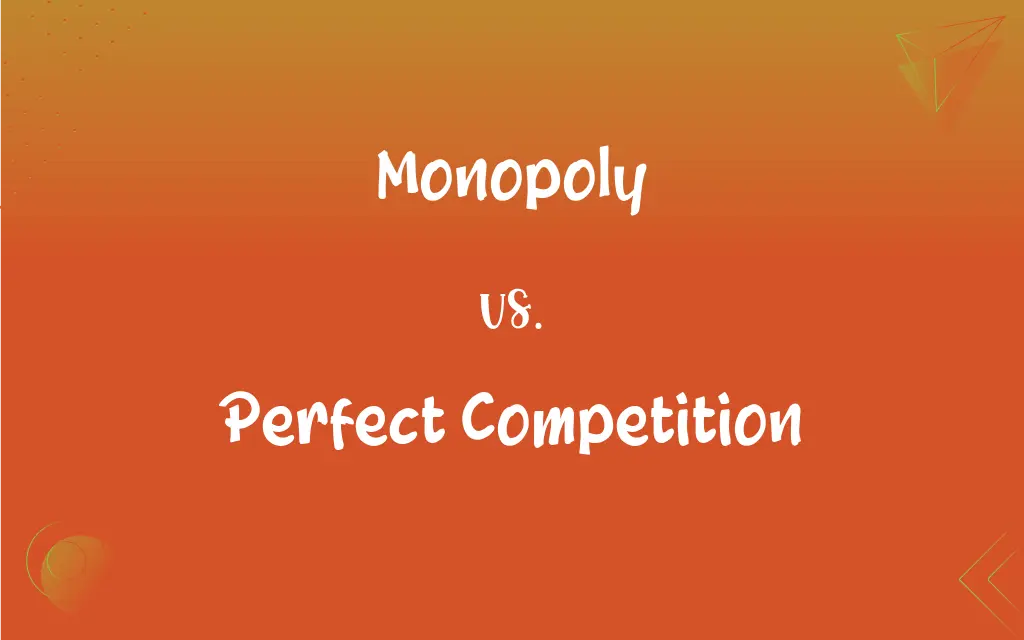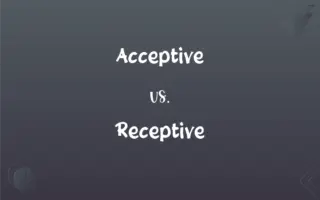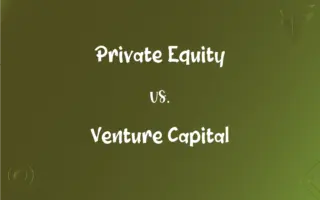Monopoly vs. Perfect Competition: What's the Difference?
Edited by Janet White || By Harlon Moss || Updated on November 16, 2023
A monopoly is where one firm dominates the market with no competition, while perfect competition features many firms selling identical products with no control over price.

Key Differences
A monopoly exists when a single firm dominates a market, allowing it to set prices and control output without competition. On the other hand, perfect competition involves many firms in the market, each selling an identical product and unable to influence price.
In monopoly, the monopolist can earn long-term super-normal profits due to the lack of competition. Conversely, in perfect competition, firms earn only normal profits in the long run as there are no barriers to entry or exit.
Consumer choice is limited in a monopoly because of the absence of competing products. In perfect competition, consumers have a wide array of choices due to the numerous firms offering identical products.
Monopoly markets may lack innovation as there's no competitive pressure. Perfect competition, with many firms vying for market share, can often lead to innovations and better products.
Pricing in a monopoly is determined by the monopolist and is often higher than in competitive markets. In perfect competition, prices are determined by supply and demand forces, leading to the equilibrium price.
ADVERTISEMENT
Comparison Chart
Market Power
Single firm dominates.
Many firms with no individual market power.
Product Differentiation
Unique product, no close substitutes.
Identical products offered by all firms.
Barriers to Entry
High barriers prevent competition.
No barriers, free entry, and exit.
Pricing Power
Can set price above marginal cost.
Price takers; sell at market-determined price.
Long-Term Profit
Can earn super-normal profits.
Earns only normal profits in the long run.
ADVERTISEMENT
Monopoly and Perfect Competition Definitions
Monopoly
Exclusive possession or control of something.
The company had a monopoly on the software used in schools.
Perfect Competition
A theoretical economic situation with no barriers to entry or exit.
In perfect competition, firms are price takers, not price makers.
Monopoly
A board game in which players buy and sell properties.
We played Monopoly until midnight and I ended up bankrupt.
Perfect Competition
A market where all firms have equal access to consumers and production knowledge.
Though rare, perfect competition offers maximum efficiency and consumer welfare.
Monopoly
A market situation where a single firm controls the entire market.
The diamond industry was once a monopoly controlled by De Beers.
Perfect Competition
An idealized market structure in which no participant can influence prices.
Many economists use perfect competition as a benchmark to assess real-world market structures.
Monopoly
The exclusive right granted by a government to trade or produce something.
She secured a monopoly to distribute the product in the region.
Perfect Competition
A market structure characterized by many buyers and sellers of an identical product.
Agricultural markets often come close to perfect competition due to the similarity in crops.
Monopoly
Dominance or undue superiority in a particular field.
He holds a monopoly over the city's entertainment venues.
Perfect Competition
A situation where every firm's actions do not affect the market outcome.
Due to perfect competition, no single firm could influence the market price.
Monopoly
Exclusive control by one group of the means of producing or selling a commodity or service
"Monopoly frequently ... arises from government support or from collusive agreements among individuals" (Milton Friedman).
Monopoly
A company, group, or individual having exclusive control over a commercial activity.
FAQs
What is a monopoly?
A monopoly is a market structure where a single firm controls the entire market.
Why might a monopoly result in higher prices?
Monopolies can set prices without competitive pressure, often leading to higher prices for consumers.
How does perfect competition differ?
Perfect competition involves many firms selling identical products with no control over price.
Can monopolies set their own prices?
Yes, monopolies have the power to set prices due to a lack of competition.
How does consumer choice compare between the two?
Consumer choice is limited in monopoly but vast in perfect competition due to product variety.
Can new firms easily enter a monopoly?
Monopolies often have high barriers to entry, preventing new firms from entering.
Do monopolies lack innovation?
Monopolies might lack competitive pressure to innovate, though it's not always the case.
What's an example of a real-world monopoly?
Historically, utilities like electricity and water were often monopolies in many areas.
Can firms advertise in perfect competition?
Typically not, as products are identical and advertising would not confer an advantage.
Are firms in perfect competition price makers or takers?
In perfect competition, firms are price takers.
Is long-term profit different in these markets?
Monopolies can earn super-normal profits in the long run, while perfect competition ensures only normal profits.
Is perfect competition common in the real world?
Perfect competition is a theoretical ideal, but some markets, like agriculture, come close.
Can a monopoly be legal?
Yes, when granted by the government, like patents for new inventions.
How is product differentiation in monopoly?
In a monopoly, the product is unique with no close substitutes.
How do monopolies arise?
They can arise from government regulation, ownership of a key resource, or through business tactics.
Do consumers benefit from perfect competition?
Yes, perfect competition often results in lower prices and greater choice for consumers.
What's a natural monopoly?
A market where economies of scale mean it's efficient for only one firm to supply all consumers.
How is information flow in perfect competition?
In perfect competition, all firms have equal access to production knowledge and market information.
How do firms compete in perfect competition?
In perfect competition, firms compete primarily on price since products are identical.
What drives firms in perfect competition to be efficient?
The need to compete on price and thin margins forces efficiency in perfect competition.
About Author
Written by
Harlon MossHarlon is a seasoned quality moderator and accomplished content writer for Difference Wiki. An alumnus of the prestigious University of California, he earned his degree in Computer Science. Leveraging his academic background, Harlon brings a meticulous and informed perspective to his work, ensuring content accuracy and excellence.
Edited by
Janet WhiteJanet White has been an esteemed writer and blogger for Difference Wiki. Holding a Master's degree in Science and Medical Journalism from the prestigious Boston University, she has consistently demonstrated her expertise and passion for her field. When she's not immersed in her work, Janet relishes her time exercising, delving into a good book, and cherishing moments with friends and family.































































